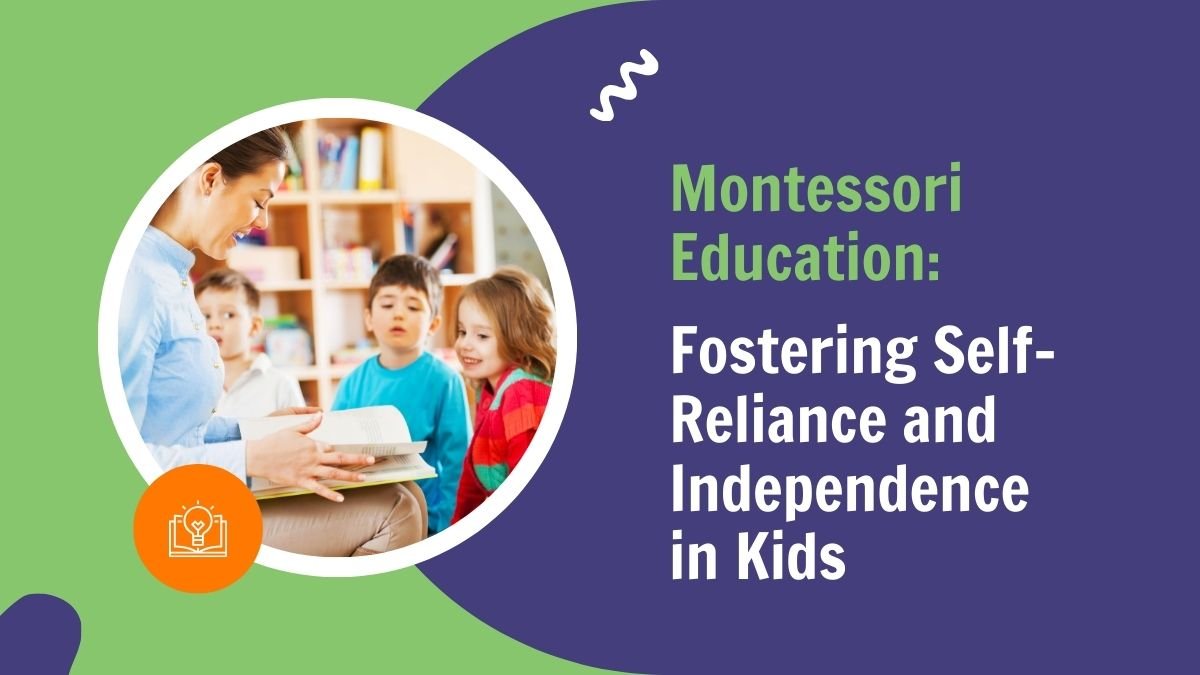Independent learning and Montessori education – the way to make children self-reliant
All parents dream of their child growing up to be independent, confident, and most importantly, having an insatiable thirst for learning, but that can only be possible if the child gets an environment right from the days of infancy where he could attempt doing things by himself and learn from his mistakes. This is the premise that Montessori education stands on.
Montessori education does not involve moving children by rote memorization from books; it creates an environment where the child can choose activities according to his interest, do them peacefully, and learn from his mistakes. Here, it is the teacher’s responsibility to act as a guide and not a strict controller.
Now let’s understand in detail on what principles the foundation of independent learning in Montessori education rests.
1. Prepared Environment
Montessori classrooms or homes prepare a unique environment for children at the prepared environment. Here everything is kept according to the height and need of the children.
- They are light and small pieces of furniture so that the child can use them independently.
- The learning materials are kept on open shelves, so the child can select what he feels like.
- Instead of toys, things-here are used, counting beads, wooden figures, small water pots, small brooms, and clothes, and-so-on.
For example, the child is thirsty; he will have a small jug and glass. Then he can pour water and drink it himself. This small act creates self-reliance and boosts confidence.
2. Freedom within Certain Limits
Montessori education has given freedom to children; however, that freedom is not absolute.
- The selected work must not disturb other children while the child is busy with the work of his choice.
- This work should also meet the completion requirement.
Example: The child may wish to build a tower out of blocks; he is free to do so, but he cannot throw the blocks around. Put the blocks back on the shelf when you are finished.
This way, the child learns to be responsible and disciplined along with independence.
3. Self-Directed Activity
When a child selects a task of his/her choice, he puts in more intensity and enthusiasm towards it.
- Some children are fond of colors; so, they will be given some task on understanding colors.
- Some are more fond of mathematics; so, he will do addition and subtraction through beads or shapes.
This practice will develop both the decision-making capability and confidence in the child.
4. Hands-on Self-correcting materials
This is one of the most special features of Montessori education. These are such materials that the child will recognize and correct his own mistakes.
- For instance, placing a block in the wrong place would not be able to fit.
- A miscalculation in counting beads would lead to an unmatched count.
This is termed “Control of Error”. Here, the child does not have to listen to the scoldings from any grown-up for learning his mistake. His learning from understanding his mistakes builds both self-reliance and self-confidence.
5. Practical Life Activities
Montessori education teaches things that are everyday activities.
- Pouring water
- Washing of utensils
- Sweeping
- Serving food
- Watering the plants
- Buttoning or putting on shoes
Such activities may seem trivial to most people, but they are very significant to every child because they build fine motor skills, concentration, and pride in completing work.
6. Teacher as a Guide
In contrast to the traditional mode of education, under Montessori, these teachers do not lecture. They are simply guides.
- They observe children attentively to know what their interest is.
- They may introduce new material or activity as warranted.
- They allow the child to discover the answer on his own and learn from the experience.
Thus, a child is not fully dependent on others but learns to think and solve problems by himself.
7. Long Uninterfered Worksheet Periods
In Montessori, children are given a chance of play and learning in a longer period than any other.
- Generally, children can spend from 2 to 3 hours engaged in any activity without interruption.
- At such times, no one would interrupt them.
Example: If a child is constructing a puzzle and is interrupted in between, he is diverted. If he has time without being disturbed, he can complete the puzzle and experience satisfaction.
This cannot overemphasize increasing concentration into the objective.
8. Mixed Age-Classrooms
Montessori classes consist of children of different ages studying under one roof.
- Younger children learn from older kids.
- Older children would get a chance to teach the younger children, which develops leadership and responsibility in them.
It is like a small society where all learn from each other.
Advantages of Montessori Education
All these principles of Montessori education have an effect on the entire personality of a child.
- The child becomes independent of self.
- The child starts having self-confidence and discipline.
- It does not fear a mistake, rather he learns from it.
- Keeps interest and enjoys learning all his life.
- Thus, he turns out to be socially and emotionally mature.
Real Example:
Reema, a four-year-old girl, was so timid when she came first to Montessori school. She felt too frightful to pour water by herself. But it took just a couple of weeks from then to pouring water on her own to sweeping. Slowly, she became confident and is now able to teach how to put on shoes meaningfully to her younger brother.
Conclusion
Not only is Montessori education for how one should learn, but is also for how to live. It invites children to be able to choose an option, to explore, to learn from mistakes, and become independent.
What makes this system beautiful is that a balance is maintained between freedom and constraints. The child is independent in learning but also comprehends responsibility and discipline in doing so.
As such, growing up, he becomes a confident, responsible, and thus, a happy person.








